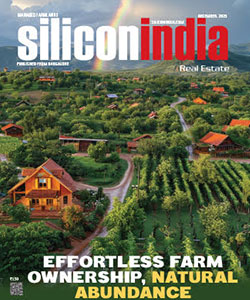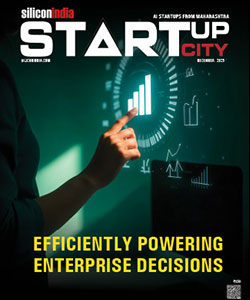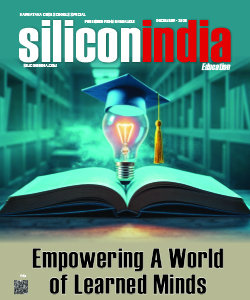The Crucial Insights into Travel & Tourism - 2025

The travel and tourism industry has evolved significantly, transitioning from a disorganized state to a more advanced and appealing one. As we look ahead into 2025, there is much more in store for this industry, driven by a deeper understanding of user behavior, technological advancements, and emerging trends. Providing a sense of structure to follow by creating trends around locale culture & discovery along with various other features, the industry leaders are increasingly boosting the business definition of travel & tourism today providing for a getaway window to people from the complex and fast-paced world.
In an exclusive interview with Mandvi Singh, Managing Editor, siliconindia, Suresh Khadakbhavi, CEO, Digi Yatra Foundation, shared his insights on ‘The Crucial Travel Insights for 2025’
How travel or tourism sector is taking the center stage across the business & industry today?
Travel is not driven by logic; it’s primarily an expression of interest. While the travel industry has always existed, it has often been disorganized. The growing awareness of travel and tourism is largely fueled by several factors, including increased disposable income, advancements in technology (such as online booking, social media, and digital devices), various travel motivations (like personalized experiences, cultural exploration, and wellness), demographic influences (such as trends created by influencers), and political and regulatory factors. Additionally, access to better information about travel destinations and itineraries, facilitated by the IoT, is also contributing to this growth.
Air travel is now completely seamless, which is transforming the travel, transportation, and hospitality ecosystems. With progressive approach, travel companies today aim to create a cohesive experience, allowing for easy hotel check-ins and secure identity validation at historical sites or more, while preserving privacy. This seamless travel experience is expected to greatly impact tourism. As people's experiences improve, they are likely to share their positive stories, showcasing the enjoyment of visiting India and its attractions. We hope to be a catalyst for boosting tourism through this initiative.
With potential changes in travel and immigration policy, what conflicting priorities a travel & tourism industry is facing today? Also, what can be done to mitigate those?
I believe that regulatory compliance is a crucial aspect in travel line. We are building a completely decentralized ecosystem that prioritizes privacy and adheres to all data privacy requirements for any organization. Since the entire ecosystem is trustless and decentralized, identity validation can occur seamlessly while preserving privacy. This ensures that there is no risk of data leakage, theft, or unauthorized access. From this perspective, I believe we are effectively addressing the regulatory aspects related to data privacy.
Data inflow is creating huge concerns around security & privacy concerns in this digitalized era. So, how companies like Digi Yatra are managing across cyber security and data management?
The organized travel industry has strategically designed its solutions with a focus on privacy. Travel companies have established an ecosystem that prioritizes privacy by design and privacy by default. This approach effectively addresses data privacy issues, particularly concerning personally identifiable information (PII) companies today are ensuring that the risk of data loss is minimized.
Data loss, theft, or leakage can occur if data is stored in a central location. However, because there is no centralized storage of user data, the likelihood of a data leak is virtually eliminated. For example, if someone were to attempt to hack into the Digi Yatra database, they would need to breach the security of 10 million users' phones, where the data is actually stored.
With respect to sustainability and environment friendliness, what steps travel & toruism industry leaders are taking?
One of the key aspects is efficiency over here. Any manual process tends to be prone to inefficiencies. Our system, however, offers a much more efficient ecosystem. As a result, it allows for faster processing. Customers no longer have to wait in long queues. In a given space, we can process or validate a greater number of customers. I believe this contributes positively to our sustainability efforts and helps reduce our carbon footprint.
With AI and Gen AI taking over and penetrating across industries, what sort of technological developments can be expected further in travel or tour industry?
I believe it’s all about adoption. Companies have largely solved the technological aspects, but AI has a much broader impact, particularly in connecting the different stakeholders involved in a single traveler's journey. For example, when you consider air travel, a passenger's experience relies on multiple stakeholders including the airline, online travel agencies (OTAs), security agencies, and the airport. There are also various service providers, like those offering porter or wheelchair services that play a role in facilitating the journey. All these disparate stakeholders need to communicate and collaborate effectively. On the airline side, there are additional service providers that must work together to create a seamless travel experience for passengers. If AI is leveraged to enhance these interactions and to use advanced information, it can significantly improve efficiency. This way, stakeholders can offer an exceptional experience to consumers while saving time and making the entire travel process more efficient.
What effects Budget 25-26 is going to lay on the travel & tourism industry? What can be expected more of companies like Digi Yatra in this digitally transforming era?
Our expectations from the government have been very specific as I have quoted pre-budget- “In the industry at large, granting infrastructure status to smaller projects, simplifying the licensing process, and rationalizing GST structures are some of the critical reforms that can help reduce operational hurdles for travel and hospitality businesses".
However, as we look at the post-budget scenario, we see that more spending power has been granted to the common man through several tax reforms. From that perspective, increased spending power can lead to more business activity. I believe this will have a beneficial impact on the economy as well.
Well, we can continue to work together and make this vision happen of providing seamless experience to customers across travel & tourism.
Read More News :
Why Zero Trust Networking is Critical for Cloud Security?
How AI Accelerates Product Development by Optimizing Designs and Reducing Time-to-Market



.jpg)

